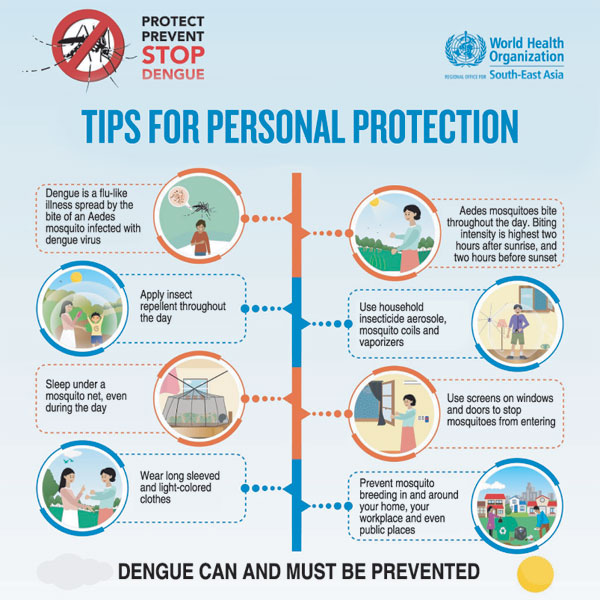Sunday Times 2
WHO: Act now to stop dengue
View(s):Special Dengue Prevention Day tomorrow
By Dr. Alaka Singh, WHO Representative to Sri Lanka
Dengue is a mosquito-borne viral infection causing a severe flu-like illness and sometimes a potentially lethal complication called severe dengue. The incidence of dengue has increased 30-fold over the last 50 years. Up to 50-100 million infections are now estimated to occur annually in over 100 endemic countries, putting almost half of the world’s population at risk.
As one of the dengue-endemic countries, Sri Lanka has reported over 43,000 dengue cases and 38 deaths as of July 21, this year. The Colombo, Gampaha and Kalutara districts in the Western Province have contributed to nearly half of the caseload. Dengue has a seasonal transmission in Sri Lanka, with two peaks occurring with the monsoon rains in June-July and October-December respectively.
With over 8,000 cases reported only in July (as of the 21st) and with over 11,200 cases in June, the current dengue case trends point towards a possibility of a dengue outbreak in the country. During the most recent outbreak in 2017, the national surveillance system reported a total of 186,101 dengue cases (866 cases/100,000 population) and 440 dengue-related deaths with a case fatality rate of 0.24%.
Dengue causes flu-like symptoms and lasts for 2-7 days. Dengue fever usually occurs after an incubation period of 4-10 days after the bite of an infected mosquito. High fever (40°C/104°F) is usually accompanied by at least two of the symptoms which include headache; pain behind the eyes; nausea; vomiting; swollen glands; joint, bone or muscle pains; and rash. It is important to seek care early and adhere to medical advice if a person experiences any symptoms of dengue.
In view of the current situation, the Director General of Health Services has declared tomorrow (July 25) as a special Dengue Prevention Day in the country. Entomological surveillance efforts by the health authorities have identified that the mosquito breeding sites include public and private institutions, factories, schools, construction sites and other public spaces. As human activity in these public places coincides with the hours of the highest biting intensity of the dengue mosquitoes, these sites contribute to a major proportion of mosquito bites. With schools reopening after a three-week break, their premises must be checked for any potential breeding sites to eliminate the risk.
In the current context, prevention and control of dengue are crucial with the aim of avoiding additional challenges and burdens to the health system. A whole of society approach with the engagement of all sectors is necessary to further strengthen multi-sectoral actions in dengue prevention and control.
The World Health Organization (WHO) has also been monitoring the dengue situation in the country vigilantly. Considering the surge in dengue cases in many high-risk districts, the WHO partnered with the Health Ministry to support the outbreak response activities through urgent clinical management training, premises inspection and procurement of insecticides for vector-control purposes, which would facilitate dengue control to avoid significant outbreaks with the south-east monsoonal rains. The benefits of this support are received by 14.6 million persons in 10 high-risk districts.
WHO Sri Lanka has also been actively engaged in providing technical assistance for the assessment of hospital preparedness for dengue, hands-on capacity-building exercises for clinical management of dengue and entomological reviews of the dengue vector. The WHO is also supporting research and evidence generation to better understand the disease and strengthen prevention and control in the future.
While reiterating our support, the WHO also encourages the public to undertake preventive actions, including cleaning of premises and removal of breeding sites, and identify mitigation methods to reduce vector breeding and help protect themselves and others. The WHO urges all state and non-state actors, partners and individuals to act now and join hands to protect, prevent and stop dengue.

